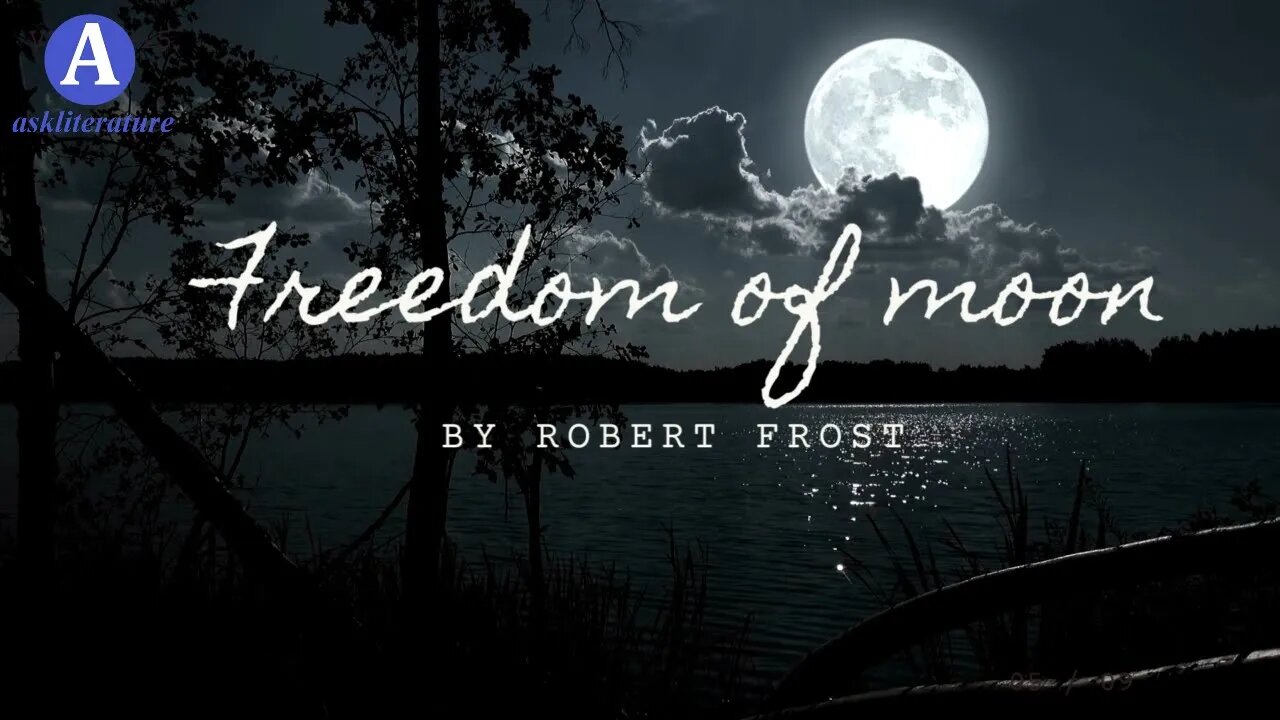Premium Only Content

The Freedom of the Moon by Robert Frost Analysis
"The Freedom of the Moon" by Robert Frost is a short and contemplative poem that explores the contrast between two celestial bodies: the Earth and the Moon. The poem begins by describing the Moon as "immaculate," suggesting its purity and freedom from the turmoil and imperfections of earthly life. The Moon seems to be an ethereal being that can observe the Earth from a distance.
The speaker compares the Moon's tranquility to the Earth's state of chaos, where "the world has burned the wires." This line may allude to human technological advancements and their negative consequences. While the Moon appears to be free and untethered, the Earth is entangled in its own creations and desires.
In the final lines, the poem suggests that the Moon's freedom might be an illusion, as it is "full of our own emptiness." This paradoxical statement hints at the Moon's symbolic connection to human longing and desire, making it just as entangled as the Earth, albeit in a different way.
Themes.
Freedom and Confinement. The poem explores the idea of freedom, contrasting the perceived freedom of the Moon with the confinement and entanglement of the Earth. However, it also suggests that both entities are bound in some form of limitation, presenting a nuanced perspective on freedom.
Nature versus Civilization. The poem juxtaposes the natural purity of the Moon with the complexities of human civilization on Earth, highlighting the tensions between the pristine and the artificial.
Longing and Desire. The Moon symbolizes human longing and desire, suggesting that even the celestial body seemingly untethered by human struggles carries its own form of emptiness and attachment.
Symbols.
The Moon symbolizes freedom, purity, and distance from earthly concerns. It also represents human longing and desire.
The Earth symbolizes the world of human civilization, its chaos, and the consequences of human actions and advancements.
Wires represents the technological entanglements of the modern world, possibly symbolizing the negative impact of human inventions and industrialization.
Literary Devices.
Imagery. The poem employs vivid imagery to contrast the Moon's serenity with the chaos of the Earth and its technological consequences.
Metaphor. The Moon serves as a metaphor for various themes, including freedom, purity, and human longing.
Paradox. The line "full of our own emptiness" presents a paradox, suggesting that the Moon's freedom is an illusion and that it, too, is affected by human emotions and desires.
-
 UPCOMING
UPCOMING
Steven Crowder
2 hours agoCNN Declares J6 Pipe Bomber White & Nick Fuentes Interview Reaction
17.6K21 -
 LIVE
LIVE
The Culture War with Tim Pool
16 minutes agoWoke Has INFECTED Goth, Punk, & Metal, MAGA Must Save the Art | The Culture War Podcast
1,828 watching -
 LIVE
LIVE
The Rubin Report
30 minutes agoCNN Host Goes Silent When Guest Proved She’d Done Her Homework on Drug Boat Facts
1,742 watching -
 59:56
59:56
VINCE
2 hours agoThe Boys At The Bureau Got The Bomber | Episode 182 - 12/05/25 VINCE
60.5K77 -
 LIVE
LIVE
LFA TV
12 hours agoLIVE & BREAKING NEWS! | FRIDAY 12/05/25
3,743 watching -
 LIVE
LIVE
Benny Johnson
1 hour agoFBI To EXPOSE January 6th Pipe Bomb Cover Up As Evidence Revealed | 'Bomber Family Was Anti-Trump…'
5,518 watching -
 LIVE
LIVE
Rethinking the Dollar
37 minutes agoRTD News Update: Retail Silver FOMO Starting In Asia
217 watching -
 1:36:52
1:36:52
Graham Allen
2 hours agoCandace Owens BACKS DOWN?! It’s Time To Burn All Of This Insanity To The Ground…..
126K723 -
 2:00:56
2:00:56
Matt Kohrs
14 hours agoLive Day Trading, Breaking Market News & Payday Friday || The Matt Kohrs Show
10.6K5 -
 LIVE
LIVE
Badlands Media
7 hours agoBadlands Daily - J6 Pipe Bomber Caught(?), Hegseth Exonerated, Drug Boat Blown Up, Texas Map Upheld
3,685 watching